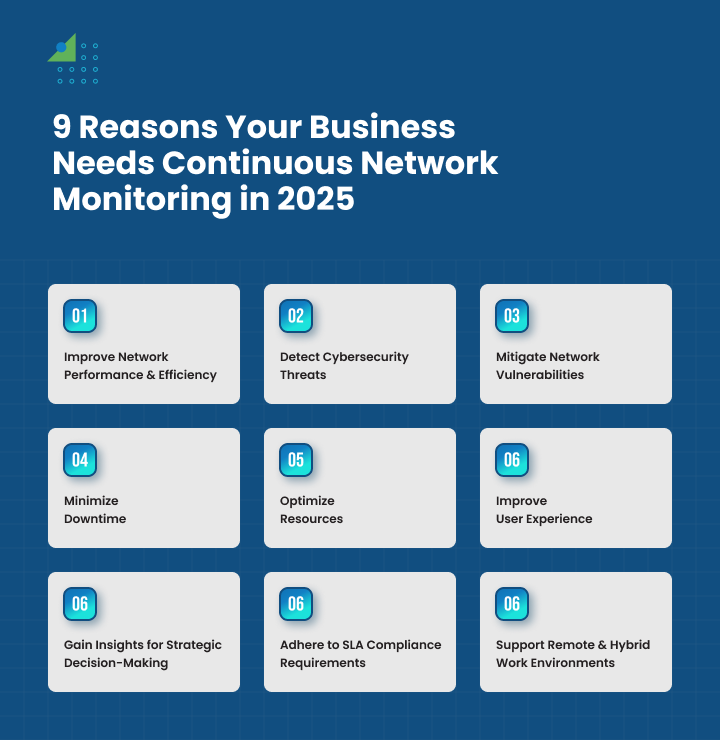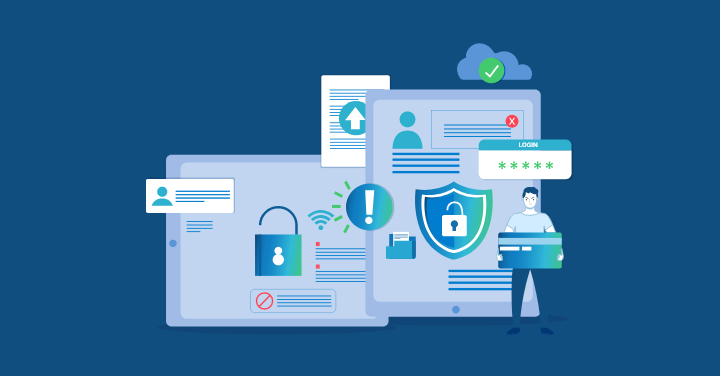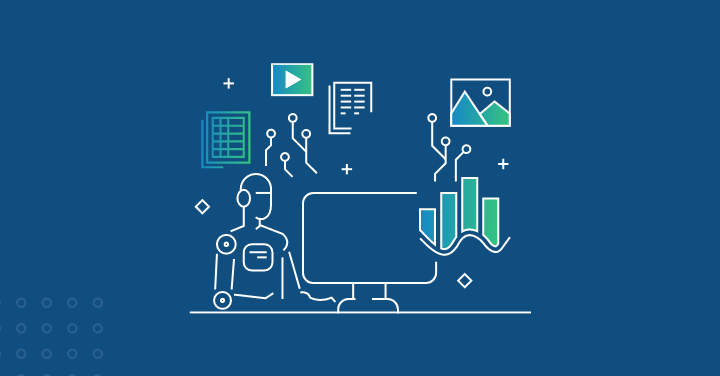Numerous technological advancements have made it easier to conduct financial transactions and business. However, cyber-attacks and network inefficiency remain a threat. That’s why your business needs continuous network monitoring.
Keeping constant watch over the IT infrastructure of your business is crucial for its survival. It would be very disappointing for your thriving enterprise to come crashing down due to easily thwarted threats that went unnoticed.
Today, I’ll cover the critical reasons your business needs continuous network monitoring. If you’ve ever dealt with cyber threats or general network issues that impede your business’s smooth operations, read on.
What Is Network Monitoring?
Network performance monitoring is the process of monitoring and analyzing your IT network performance data, including factors like network congestion and the overall efficiency of a network, which is essential for network traffic measurement. It helps businesses keep track of devices, connections, and data flows. This ensures that the network runs smoothly without interruptions or performance issues.
Network performance monitoring is the process of monitoring and analyzing your IT network, including network device monitoring. It helps businesses keep track of devices, connections, and data flows through effective network monitoring software, ensuring that the network runs smoothly and maintains optimal network performance without interruptions or performance issues.
The primary purpose of a network monitoring system is to identify and address network problems quickly — before they can do any damage. It helps you track slow connections, system outages, or security threats in real-time, revealing the root cause of issues as they arise.
It helps businesses maintain reliable communication and data exchange. It ensures that critical operations continue without delays so you can avoid unexpected downtime that can hurt productivity and revenue.
Reasons Your Business Needs Continuous Network Monitoring
Now, I’ll discuss the nine key reasons your business needs continuous network monitoring.
1. Improve Network Performance and Efficiency
Poor network connectivity can cause operational delays, drop employee productivity, and frustrate customers. When employees struggle with slow connections, their work takes longer to complete.
Additionally, customers might leave your website or app if it’s too slow, leading to lost revenue. You need the best website builders, such as the ones listed in this Attrock list, to create an SEO-optimized website that improves your online presence.
Continuous network monitoring helps identify slow spots and fix bottlenecks in real-time. It also ensures that network traffic flows efficiently, preventing unnecessary downtime.
Performance optimization is a key part of the reasons your business needs continuous network monitoring. It ensures your network operates at its best, so employees stay productive, and customers stay satisfied.
Simply put, network monitoring protects your business from disruptions that could impact operations and brand credibility.
2. Detect Cybersecurity Threats
The average cost of a data breach worldwide in 2024 currently stands at $4.88 million. This is proof that there’s a lot at stake.
Cybercriminals are becoming increasingly sophisticated, making it more challenging for businesses to defend against evolving threats like malware, ransomware, and phishing attacks.
Continuous network monitoring helps businesses spot unusual traffic patterns or unauthorized access attempts. Companies can analyze these anomalies and act before minor issues become significant breaches.
This proactive approach is one of the key reasons your business needs continuous network monitoring.
For example, if a hacker tries to access your system, monitoring tools can detect this and alert your IT team. This way, they can immediately block the threat. You’ll also need cloud email security to keep your email data safe.
This is especially critical for businesses hosting events or conducting operations in prestigious venues in Monaco, where maintaining high-security standards is paramount. Venues with advanced monitoring tools ensure sensitive data stays secure during high-profile events.
Ultimately, fast action and implementing necessary measures build more trust in your brand, as your customers are assured that their data is kept safe.
You can use many continuous security monitoring tools to keep your business safe. Examples include Nagios to keep servers safe, Cloudflare for cloud computing systems, and FirstPoint for protecting IoT devices.
3. Mitigate Network Vulnerabilities
Being able to mitigate network vulnerabilities before they fester is one of the top reasons your business needs continuous network monitoring.
Businesses face so many vulnerabilities every day. Examples include SQL injections, weak passwords, unpatched systems, malicious uploads, and more.
Here’s a breakdown of the most potent network vulnerabilities that businesses faced in 2025:
These vulnerabilities can go unnoticed for weeks or months without regular network monitoring. Hackers look for such weak spots. If they find one, they could steal data or disrupt services. For example, an unpatched system might allow malware to spread quickly, causing significant damage.
Continuous monitoring tools can scan for unusual activity and unauthorized access attempts. Anytime something suspicious is detected, you must act quickly to mitigate it before it causes irreparable damage.
If you run a business, consider automating notification alerts anytime a threat is detected. When it comes to business security, how fast you act is the most critical aspect of it all.
4. Minimize Downtime
According to CNN, the July 2024 CrowdStrike outage is estimated to have caused $5 billion worth of downtime losses for Fortune 500 companies worldwide. That’s how costly IT downtimes can be and why it’s essential to minimize downtimes.
Continuous network monitoring is essential to prevent such losses. It allows businesses to detect and resolve issues before they cause downtime. This proactive approach ensures smooth operations and is one of the key reasons your business needs continuous network monitoring.
Investing in real-time server monitoring tools for network performance is also necessary. For example, if a server shows signs of failing, the system alerts your IT team immediately. This early warning enables quick fixes, preventing service interruptions.
5. Optimize Resources
Efficient use of network resources is one of the key reasons your business needs a continuous network monitoring tool for optimal network health. It helps companies to understand how their network metrics and potential issues related to resources are used and where to improve. This ensures resources are appropriately allocated.
Continuous monitoring identifies unused or underused systems and highlights areas where application performance monitoring could be improved. For example, monitoring tools provide insights that help you redistribute workloads if one server is overloaded and another is idle.
Properly utilizing resources has several benefits:
- Reduced Costs: Avoid unnecessary spending by identifying unused equipment or services.
- Improved Performance: Ensure critical applications and systems get the resources they need.
- Better Planning: Use data to predict future needs and scale your business accordingly.
- Increased Lifespan: Avoid overloading hardware, which helps extend its operational life.
Furthermore, businesses can avoid delays and downtime when they optimize their resources. This also means resources will be available that could be redirected to crucial areas of the company that need improvements.
6. Improve User Experience
A slow, unreliable network connection with high latency can lead to packet loss and potential network issues, frustrating employees and customers alike. Continuous network monitoring is essential to maintain fast response times and the total time for optimal performance for website visitors. It also ensures that your team’s collaboration tools work seamlessly.
For employees, a reliable network means efficient access to necessary resources. It ensures that communication platforms function without interruptions, enhancing network availability. This reliability boosts productivity and morale.
For customers, a fast and responsive website encourages engagement and increases conversions and repeat visits. A positive customer experience strengthens your brand’s reputation.
Therefore, ensuring your business website and apps run smoothly is among the top reasons your business needs continuous network monitoring. You can’t always track everything on your own, so invest in tools to do that for you.
7. Gain Insights for Strategic Decision-Making
Making data-driven decisions is crucial for today’s businesses. Relying on instinct alone isn’t enough. Companies should keep updated on trends and customer behavior to tailor their products and services to meet expectations.
You can’t achieve this without continuous network monitoring.
For example, companies can identify peak usage times by analyzing traffic trends. This helps in allocating resources effectively to prevent congestion. Similarly, identifying underused resources can lead to cost savings by reallocating or scaling down unnecessary infrastructure.
With the right insights, you can anticipate future needs and invest accordingly without compromising performance. This is how you maintain a competitive edge in a market that changes so rapidly.
8. Adhere to SLA Compliance Requirements
The last thing you want for your business is compliance issues. They’re costly and can interfere with your goal to increase sales.
Many businesses operate with service-level agreements (SLAs). These agreements have strict rules on uptime, response times, and performance metrics. Missing these targets can lead to penalties or damaged relationships with clients.
This is where continuous network monitoring comes in.
It ensures that your network is running smoothly and meeting all performance requirements. Tracking uptime and performance helps you identify problems before they escalate.
Another benefit of continuous network monitoring is that it documents incidents. Every issue is logged, and detailed reports are generated. This data helps show that you’ve met your SLA commitments.
You can even incorporate it into your business deck next time you pitch your business to investors because they rarely ever invest in a company with legal issues.
These are just some of the reasons your business needs continuous network monitoring. Being on the right side of the law makes economic sense.
9. Support Remote and Hybrid Work Environments
Last on our list of reasons your business needs continuous network monitoring is providing support for remote and hybrid work environments.
These types of work setups have become more common. This brings unique challenges to network performance. Issues like latency, bandwidth congestion, and security gaps in endpoint devices can impact productivity.
Continuous network monitoring helps track and address network slowdowns. It can identify latency issues or bandwidth congestion before they disrupt work. It also tracks traffic and ensures safe connections for every remote-access worker.
Conclusion
You can see how vital having a reliable way of monitoring your business network, including network bandwidth and bandwidth usage, as well as bandwidth utilization, can be for complete visibility. It could help you keep cyber threats in check, optimize resources optimally, or improve user experience. All these are vital reasons your business needs continuous network monitoring.
If you’re a business owner looking to implement continuous network monitoring into your business but don’t know where to begin, then Motadata, like WhatsUp Gold, is here to help by preventing poor performance. We have a wide range of real-time monitoring tools you might be interested in. Get in touch.








